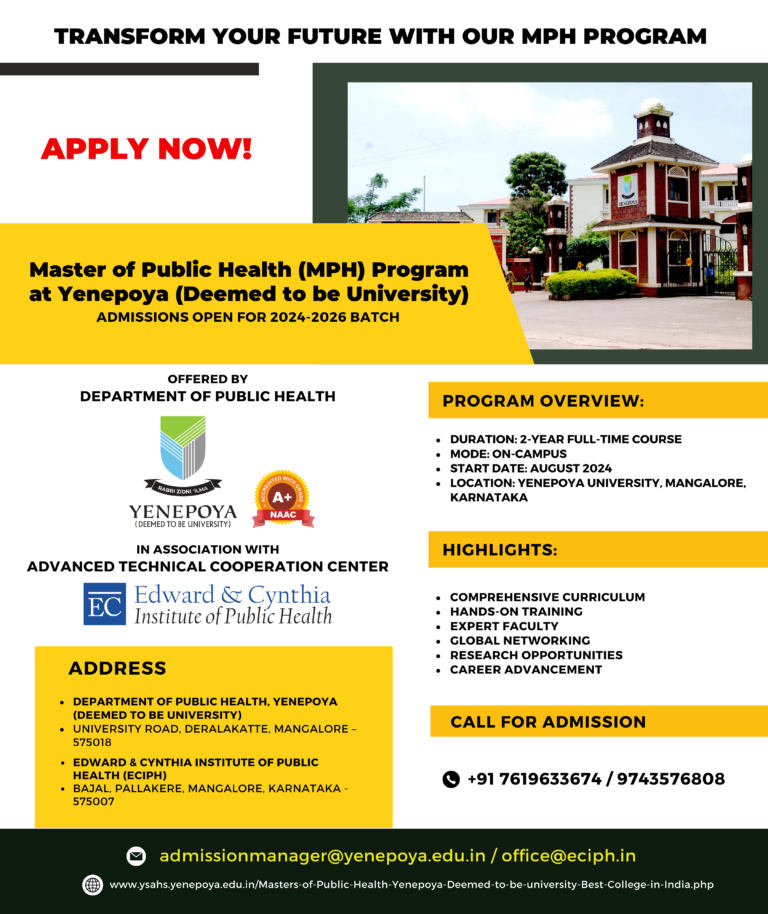Masters of Public Health ( MPH)
Public health is responsible for everything from clean air and water to safe workplaces; from controlling the spread of infectious diseases and preventing chronic diseases to improving community-based nutrition; from reducing road traffic accidents to designing quality health systems and further strengthening them. Partnering with national and local governments, public health professionals respond to humanitarian emergencies, pandemics, and any other threat to population health. And while medicine is vital for each of us when we get sick, public health benefits everyone, young and old, rich and poor, healthy and unhealthy, millions at a time, and in ways that ensure health beyond what any of us alone can accomplish.
Although the history of public health is filled with important discoveries, this is a science that remains dynamic in nature and gets updated on a regular basis. Public health scientists examine familiar areas of disease, disability, and safety, as well as conditions that alter the health landscape such as technological advancement, novel infections, and environmental shifts.
The field is divided into several areas of specialty, each with its own approach to improving health. Epidemiology is the cornerstone science of public health defining the causes, distribution, and prevention of disease and disability. When populations experience the effects of ill health, epidemiologists find solutions. Biostatistics, with the capacity to measure, monitor, and analyze complex data, is a force in population sciences, from genetics to precision medicine, from brain science to clinical trials. Biostatisticians extract meaning from big data, leading us to quantifiable evidence used by all public health disciplines.
Environmental Health Sciences examines our environment to explain how it contributes to health, whether measuring the effect of toxic substances on brain development, reducing levels of arsenic found in drinking water, or understanding how climate change and air pollution affect health. When health is impaired due to social forces such as racism, homelessness, or homophobia, Sociomedical Sciences is called upon to explain and alleviate the burdens of ill health.
Considering topics like humanitarian assistance, migration, and reproductive health, Population and Family Health studies the unique issues that affect health for the most vulnerable, including children, refugees, and expectant mothers. Health Policy and Management evaluates health systems to build knowledge of how nations and local organizations can deliver more health at lower cost. Researchers train professionals to become leaders everywhere—from government to nonprofits, from hospitals to the insurance industry. At the department of public health, we groom people to become world class public health professionals which provides for placement security naturally.
MPH Focused Concentrations:
- Epidemiology
- Environment and Occupational Health
- Disaster Management & Climate Change
- Public Health Nutrition
- Demography
- Global Health Diplomacy
- Corporate Social Responsibility
- Health Systems Strengthening
- Research
- Social and Behavioural Health
- Infectious and Non-Communicable Diseases
- Mental health
- International Health and Policy
Advanced Technical Cooperation Center:
Edward & Cynthia Institute of Public Health (ECIPH) is recognized by Yenepoya ( Deemed to be University) as an Advanced Technical Cooperation Center to support Masters of Public Health (MPH) course. Edward & Cynthia Institute of Public Health works with Governments, Diplomatic Missions, United Nations Agencies, Corporate Companies in strengthening public health risk reduction initiatives.
Program offered:
- Masters of Public Health (MPH)
Eligibility
To be eligible, Graduation in any one of the following from an institution recognized by responsible council wherever applicable and is affiliated to Yenepoya University or from any other university established under law considered equivalent thereto by Yenepoya University or UGC approved Universities in India and around the world having completed bachelors in medicine, dental, nursing, pharmacy, AYUSH, allied health sciences, Arts, Commerce, Law, Engineering, Management, journalism, sociology, biostatistics, psychology, nutrition studies, demography, anthropology, population studies or any other stream. The candidate shall have obtained permanent registration from the respective state or central council wherever applicable. The candidate shall have obtained a minimum of 50% aggregate of marks in all the years of university examination of degree course. In case of SC/ST/OBC candidates the minimum marks shall be 45%.
Degree will be provided by Yenepoya (Deemed to be University), Mangalore


